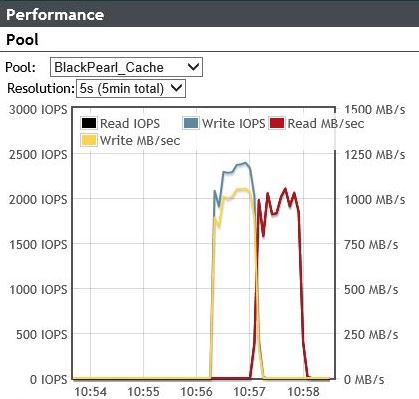We have released an update to the Java CLI BlackPearl client. You can download this latest release (1.2.4) from the Java CLI Releases page on GitHub. There are several updates in the new release, including two major new features detailed below.
Symbolic Link Support
Support was added for Symbolic Links in Unix/Linux. This is relevant in the case where the put_bulk command is used to move a directory of files to BlackPearl. If the Java CLI sees that the directory contains a symbolic link, it will attempt to also include the file to which the symbolic link points (even if it is not in that directory). Here are a few important notes regarding symbolic link support:
- The user account under which the Java CLI is being run must have access to the file to which the symbolic link is pointing.
- If there are several symbolic links pointing to the same file, but from different folder paths, BlackPearl will include a copy of the file for each symbolic link because each “file” is in a different folder path.
- When the CLI restores the file from BlackPearl, it will restore the actual files, not the symbolic links. This is because BlackPearl is not aware that it is a symbolic link.
Performance Test
We added a new performance command to the CLI. We hope this new performance test will make it easier to troubleshoot BlackPearl performance. This command tests network performance as well as the performance to the BlackPearl cache. This does not test the back-end performance of the BlackPearl (speed between BlackPearl and tape library or permanent disk target).
Users can specify the number and size of files in the test. The files are automatically generated on the fly by the CLI and not written to disk (this eliminates the disk read/write speed from the test). When the command is executed, the CLI will send these files to BlackPearl in a PUT operation. Once the PUT operation is complete, the CLI will then issue a GET operation to retrieve those same files from BlackPearl.
Here is an example of the performance command being run. In this case there were 50 files, each 1000MB, using a bucket called “performance_testing”:
ds3_java_cli -e 10.85.41.86 -a Z3JlZ2o= -k 4QJFANLi -c performance -b performance_testing -n 50 -s 1000 --http
Here is the output from the CLI (results highlighted in yellow):

Here is the corresponding performance graph from the BlackPearl web management interface.

We hope these new features will make it easier to use BlackPearl. Please give us your feedback or ask questions on our Forums.
